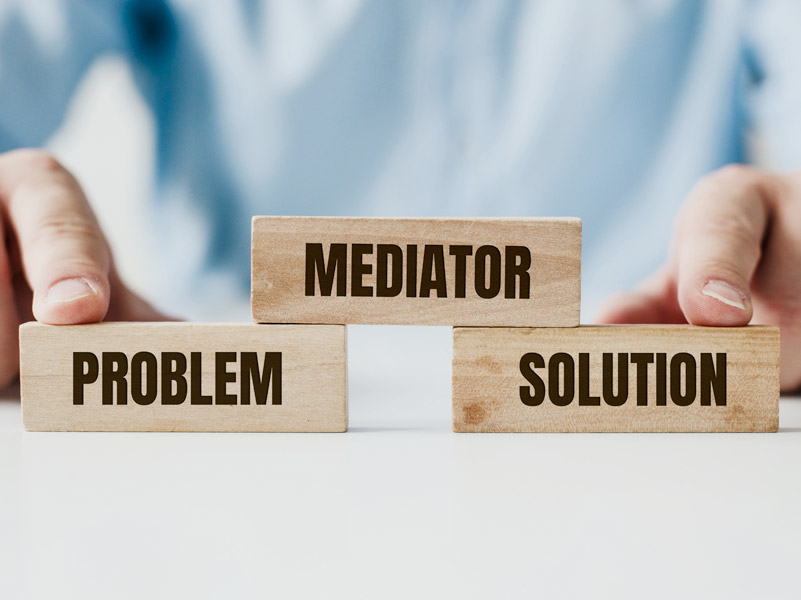When a legal dispute arises, court is often seen as the default solution — a place where a judge determines who is right and who is wrong. But is litigation truly the only option available?
In-fact, the Indian legal system offers multiple avenues for resolving disputes. Under Section 89 of the Code of Civil Procedure (CPC), courts are empowered to refer cases to various alternative dispute resolution (ADR) mechanisms:
- Litigation (where the case is fought in court)
- Arbitration (where a neutral arbitrator issues a binding decision)
- Mediation (a process facilitated by a neutral third party)
- Lok Adalats (community courts for quicker resolution)
Among these, mediation stands out for its focus on collaboration over confrontation. It is a process where the parties have ownership over the outcome, guided by a trained mediator who helps facilitate the conversation. Mediation offers a chance to resolve disputes in a manner that preserves relationships and avoids the strain of prolonged litigation. Mediation can be conducted through private mediation centres, court-annexed programs, or even by independent mediators.
Section 89 CPC is designed with this in mind, encouraging parties to explore mediation as an alternative before heading into a prolonged legal battle. Mediators, with their process expertise, are skilled at navigating the dynamics of conflict—helping parties communicate effectively, address underlying/unidentified interests, and unlock creative solutions even when emotions run high.
What distinguishes mediation is the expertise mediators bring in managing conversations, breaking deadlocks, and creating an environment conducive to meaningful dialogue. In doing so, mediators adhere to three core principles:
- Neutrality: Mediators remain impartial, ensuring that neither party is favoured.
- Self Determination: The disputing parties control the outcome, with the mediator facilitating the process.
- Confidentiality: All discussions remain private, and no information is disclosed without the parties’ consent.
Beyond settlements, mediation is often instrumental in rebuilding and strengthening relationships, which can be particularly beneficial in business partnerships, family disputes, or ongoing commercial interactions.
The Mediator’s Role: Expertise in Process Management
You might wonder: why involve a mediator when you can negotiate directly? The answer lies in the strategic process management that a mediator brings to the table.
While negotiation should ideally be the first approach, it can often fail due to emotional biases, past grievances, or entrenched positions. These factors make it difficult for parties to see beyond their immediate stance, leading to stalemates or escalated conflicts. This is where the mediator’s expertise in process management becomes essential.
Mediators are skilled at recognising when discussions become stagnant or when emotions derail productive conversation. By using techniques like reframing issues, reality-testing, and facilitating active listening, mediators help keep the dialogue focused and progressive. This expertise in guiding difficult conversations is crucial to moving the parties toward a resolution.
Consider a recent life insurance dispute I mediated. The case involved a complainant who had lost his father and was in conflict with the insurance company over a rejected claim. The company argued that the family had not disclosed critical medical information during the policy application, leading to the claim’s denial. The complainant, however, insisted that his family was unaware of these medical conditions.
Initial discussions revealed the frustration on both sides. The complainant had faced multiple claim rejections and was emotionally drained, while the insurance company was firm in its stance, citing policy violations. At this point, the conversation could have easily reached an impasse. However, by carefully managing the process, I was able to guide the dialogue in a more constructive direction.
In one of the joint sessions, the complainant made a direct appeal: “Our family is not in the best financial situation after my father’s demise, and we were really depending on the insurance amount for some relief.” This heartfelt statement shifted the conversation. As the mediator, my role was to ensure both sides were truly engaged—not just listening, but empathizing with each other’s circumstances. By facilitating this deeper understanding, I helped create a space where both parties could acknowledge each other’s reality.
The insurance representatives began to empathize with the complainant’s predicament, while the complainant came to understand the company’s reasons for rejecting the claim. With this mutual understanding established, the discussion evolved from rigid positions to creative problem-solving. Although a full payout was not feasible, the company agreed to a partial settlement. For the complainant, this amount provided much-needed financial support during a challenging time.
The Value of Mediation: More Than Just a Settlement
This case demonstrates how parties often enter a mediation adamant about a specific outcome. However, through the mediation process, the mediator uncovers the underlying reasons and significance behind their demands. This can lead to profound insights for everyone involved, including the parties themselves. Mediation is not just about reaching a settlement; it’s about transforming how parties communicate and collaborate. In a traditional adversarial setting, one party might have won while the other lost. In this mediation, both sides left the table with a resolution that honoured their respective needs.
Mediation’s unique strength lies in its ability to foster dialogue even when emotions run high or negotiations hit a roadblock. The mediator’s process expertise ensures that discussions remain constructive, hidden interests are addressed, and potential solutions are explored.
Why consider Mediation?
While adversarial proceedings have their place, especially in criminal cases or non-compoundable offenses, most civil and commercial disputes can benefit from mediation.
When conflicts seem unresolvable and traditional negotiations reach a deadlock, mediation offers a path where solutions are built, not imposed. It’s a process that empowers you to resolve disputes on your own terms—guided by expertise, driven by dialogue, and focused on outcomes that work for everyone involved.
If you’re navigating a dispute and seeking a resolution that truly addresses the needs of all parties, consider exploring mediation as your first step toward a meaningful and lasting agreement.
Author
-

Anubhab Banerjee is a certified mediator and an advocate based in India, dedicated to advancing the field of mediation in India. He received his 75 hours of mediation training from CAMP and the Edwards Mediation Academy. He is a Mediation Advocate Accredited with SCMA, London. He currently works as a Principal Associate with CAMP Arbitration and Mediation Practice.
View all posts


